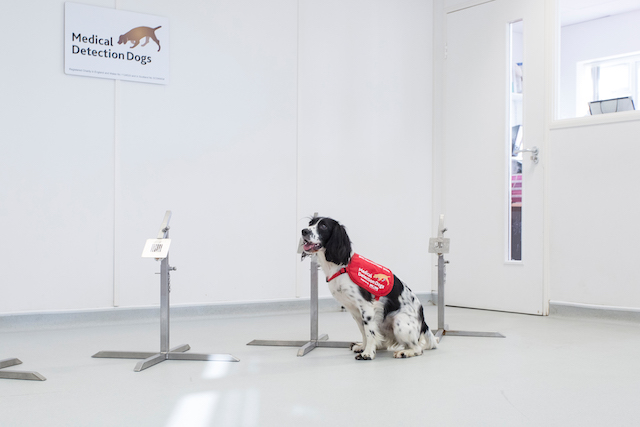


Dogs are the superheroes we don’t deserve. They look incredible in capes, can parse human speech, and can even read your mood. They also might be able to sniff out malaria.
A group of researchers in the United Kingdom trained dogs to detect malaria in people infected with the disease but who had no fever or physical symptoms. They presented the results this week at the annual meeting of the American Society of Tropical Medicine and Hygiene in New Orleans.
Malaria is a global problem. Despite $2.7 billion in funding to eradicate the disease, malaria still infected 216 million people and killed 445,000 worldwide in 2016, according to the World Health Organization. Some countries have had success—Sri Lanka, for example, declared itself malaria-free that same year—but others, like South Africa, have fallen behind the WHO’s goal of eliminating malaria in that country by the year 2020.
The effort to train malaria-sniffing dogs developed out of a paper published earlier this year that identified the smell of malaria, says James Logan, head of the disease control department at the London School of Hygiene and Tropical Medicine who was involved in both studies. Logan and his colleagues found people infected with the malaria parasite, even if they show no symptoms of the disease, give off a distinct perfume of aldehyde compounds. Mosquitoes happen to love this smell, and will seek out the person putting this funk out into the world. If mosquitoes can home in on these compounds, Logan and his colleagues wondered if dogs could do the same.
It’s not a totally crazy idea—dogs are known for their sense of smell, and specially trained puppers can sniff out cancer. Dog sniffers could be faster and less invasive than current diagnostic tests, says Logan, which involve taking blood samples and analyzing them with special equipment. And if dogs could detect the smell on people who experience no symptoms of malaria, it would be possible to stop those individuals from spreading malaria unknowingly.
For this “proof-of-concept” study, as Logan calls it, experts from Durham University in the U.K., the London School of Hygiene and Tropical Medicine in both the UK and The Gambia, and a charity called Medical Detection Dogs worked on this project through a grant received from the Bill & Melinda Gates Foundation. .
Logan’s team collected socks worn for 12 to 24 hours by children in The Gambia. Some had no malaria infection while others were infected but showed no symptoms. The scientists brought the socks back to the U. K. and froze them while they trained two dogs to identify the malaria smell. Several months of training later, the dogs correctly identified 70 percent of the malaria-infected children and 90 percent of the malaria-free children, all from smelling their socks.
“We were genuinely surprised with how well it worked,” says Logan. “We knew dogs were able to smell cancer and we thought it should work…but this is a very tough test.”
With just two dogs in the study, this research isn’t ready for widespread use, says Logan. Next, they hope to train more dogs to perform sniff tests on actual, live human beings. Logan says they also plan to see if dogs can learn to identify different types of malaria from various parts of the world, or if their abilities are limited to identifying generic malaria infections. They also plan to investigate whether they can use the dogs as a guide for developing an electronic “nose” to find infections, says Logan.
Tovi Lehmann, who studies the spread of mosquitoes and parasites throughout the world for the National Institutes of Health, and in his research has trained dogs to identify places where mosquitoes might hide dormant. In his experience, dogs get better the more they work at something, so their performance could improve the longer they work at sniffing out malaria, he says. He also points to the importance of teamwork between dog and trainer.
But, he points out, training detection dogs is a time and labor intensive process which could ultimately limit how useful malaria detection dogs can be.
One possible use for these smart doggos could be at airports, borders, or other entry points into countries or areas considered malaria-free or almost malaria-free, says Logan. Deploying these pups could prevent reintroduction of the disease, or help eliminate it entirely. Give a dog a job, and they just might help change the world—and look great while doing it.
